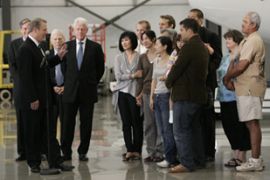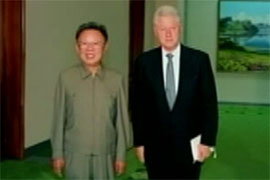US warns ‘provocative’ N Korea
Obama says pressure over nuclear programme will continue despite reporters’ release.

| In depth |
|
|
“We were very clear this was a humanitarian mission,” Obama said in a television interview.
“We have said to the North Koreans there is a path for improved relations, and it involves them no longer developing nuclear weapons and not engaging in the provocative behaviour they have been engaging in.”
Obama also hailed the “extraordinary work” achieved by the former president that led to the release of Ling and Lee.
Less than 24 hours after arriving in the North Korean capital, Pyongyang, Clinton left with journalists after securing a “special pardon” for them in talks with Kim Jong-il, the North Korean leader, state media said.
The two reporters who worked for the California-based Current TV co-founded by Al Gore, Clinton’s former vice-president, were found guilty in June of “hostile acts” against North Korea and had been sentenced to 12 years of hard labour.
‘Propaganda victory’
Some prominent conservative critics however have said that Clinton’s trip was a mistake, rewarding North Korea for bad behaviour.
 |
| Some critics of Clinton’s trip say Pyongyang had scored a propaganda victory |
John Bolton, a former official in the Bush administration, said the visit was a a propaganda victory for North Korea.
“In Pyongyang’s view, the two reporters are pawns in the larger game of enhancing the regime’s legitimacy and gaining direct access to important US figures,” he told the Washington Post newspaper.
“So the Clinton trip is a significant propaganda victory for North Korea.”
Speaking at the start of a seven-day trip to Africa, Hillary Clinton, the US secretary of state, insisted that her husband’s visit to Pyongyang would not affect the US insistence on resuming nuclear disarmament talks with North Korea.
“We have always considered that a totally separate issue from our efforts to reengage the North Koreans and have them return to the six party talks and work towards a commitment for the full, verifiable denuclearisation of the Korean Peninsula.”
Nonetheless, following the reporters’ release, Clinton expressed hope that talks would begin soon.
“Perhaps they will now be willing to start talking to us and other nations,” she said.
Call for talks
The release of the two US reporters also led the UN secretary-general to add his voices to hopes of resumed talks on eliminating the North’s nuclear weapons programme.
“I welcome the release of two American journalists by the DPRK,” Ban told reporters in New York on Wednesday, using the formal name for North Korea.
“I hope that this kind of encouraging move will lead to resumption of dialogue with the DPRK with all the parties concerned to resolve all the issues including nuclear issues.”
Ban, a former South Korean foreign minister, said last week he believes that the stalled six-nation talks on North Korea’s nuclear programme are “a good way” to address the standoff but would also support a one-on-one dialogue between North Korean authorities and the United States “if necessary”.
Relations between North Korea and the US have worsened following Pyongyang’s second nuclear test on May 25 and consequent United Nations sanctions.
North Korea pulled out of six-party talks on its nuclear programme, expelled nuclear inspectors and test-fired a barrage of missiles in defiance of the sanctions.
It has also released a stream of bellicose rhetoric against South Korea and the US, warning of imminent war, but indicated last week that it was open to direct talks with Washington.
The United States has said it is willing to hold direct talks with Pyongyang but only on the sidelines of the main six-party nuclear disarmament talks that bring together negotiators from US, China, Japan and Russia and the two Koreas.

 Clinton’s high stakes N Korea dash
Clinton’s high stakes N Korea dash